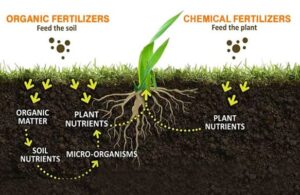Why and What is Organic Manure?
Why and What is Organic Manure
Why and What is Organic Manure?
The population of the world has been increasing year by year, day by day. On the other hand, the natural resources which provide food for mankind remain limited. So scientists and economists of the world have been thinking of a means by which the quantity and quality of food could be increased to meet the sufficient need of mankind. And as a result, various chemical fertilizers have been invented. The twentieth century was the heyday of using chemical fertilizers as an extra means of enhancing agricultural products. The use of chemical fertilizers got much popularity in Western Countries and later on it got spread to the third world. But within only a few years it is found that the chemical fertilizers have fallen adverse effects on flora and fauna. The constant use of chemical fertilizer destroys the natural nutrients and stamina of soil which is almost irreparable. More, the use of chemical fertilizers give rise to new and new disease on plants against which various kinds of pesticides and insecticides were invented. Too much use of pesticides and insecticides make both the crops and soil toxic which causes harms to our health and environment.
Report says that the use of chemical fertilizers was tenfold from 1945 to 1970. In 1995 about 5.2 million tons of fertilizers were used throughout the world, 2/3 of which was applied in western countries. In India, about 80,000 tons of insecticides were used for which the nutrients of the soil have badly deteriorated. Already the states of Bihar, Uttar Pradesh, Punjab, and Haryana have suffered a lot from the adverse effect of the use of chemical fertilizers. Thousand and thousand of acres of land have become totally unsuitable for cultivation. Even the cattle grazing on such lands have faced death.
Experiencing such adverse and deadly effects of chemical fertilizers the agro-scientists, cultivators and the governments of some countries have begun to think of an alternative to chemical fertilizers. In this respect, the pioneer was an English botanist Sir Albert Howard. He, in the 4th decade of the twentieth century, put forward an idea of using a kind of fertilizer that is made from the decayed matter of living beings including cow dung, urine, rotten leaves and other domestic wastes. And this kind of fertilizer was called Organic Fertilizer. At first, his ideas caught less importance, but later on some other scientists and humanists as J.I. Rodeli, F.B. Balkar, P.H. Rainworth and some others put emphasis on the use of organic manure as an alternative to chemical manure.
Organic manure has the following qualities as—
(i) It is a well-balanced nutrient source.
(ii) It is cheap.
(iii) The cultivators can prepare them easily at home.
(iv) The heating phase destroys weed seeds and pathogens.
(v) It suppresses soil-born diseases.
(vi) It maintains PH in soil.
(vii) It increases soil organic content.
Already in western countries, the Organic Movement has begun but in underdeveloped and developing countries, this movement has not reached fully. Here to say that agriculture run by applying organic manure is called Organic Agriculture. A farm to be certified as an organic farm must fulfill the following conditions:
(i) It must avoid any kind of chemical fertilizers and chemical medicines. Instead, the farm must apply organic manure which is generally made from cow dung, home wastes, rotten flesh, the blood of animal, dry leaves, etc.
(ii) During the conversion period, it should grow these plants which create green manure in the soil.
(iii) Besides the main crop there should be nursed domestic fowls, cows, pigs or fish.
(iv) The unnecessary weeds should be removed by tools or by hand without using the medicine.
(v) To control insects and other diseases the farmers should use such thing as—margosa leaves, garlic, powder of dry chilli and such things which are found in nature.
(vi) We should nurse such flies and birds which eat away deadly insects from the farm.
(vii) The field should have no connection with the open and unprotected fields.
(viii) There should have facilities of processing for the products.
(ix)The products of organic farms should be distinguished from others by leveling and packaging.
(x) The cultivators of such production should keep written records of all the processes and steps of cultivation and production.
(xi) The farm holder should collect certification from concerned officials to convince his customers that his products are organic based.
(xii) The labourers involved in such organic farming should have social justice and the right to assure that their products would not fall any adverse effect on the environment.
To Sum up, it is to say that till today it is found that organic farming is the safest which increases production without causing any harm to the soil and environment. But in the countries like India and other underdeveloped countries, the organic movement has not begun in full swing and it is because the people are not conscious of such farming. The need of the time is that people, in general, must be aware of the adverse effect of chemical farming and of the effective and prolific effects of organic farming. Besides, we should take the following measures to facilitate and popularize this kind of beneficial farming:
(i) Educated people must come out to make the general public and cultivators aware of such farming.
(ii) By laying down strict laws against the use of any kind of chemical fertilizers and chemical medicine, the government must encourage cultivators, farmers and others to follow organic farming by providing agricultural tools and bank loans.
(iii) The agro-scientists and others must lead research work in favour of such farming and enrich the farmers with necessary suggestions.
(iv) The farmers should be encouraged by determining reasonable prices for their production.
(v) The government should provide the farmers with all agricultural information so that their knowledge might be up to date.
(vi) There should have proper facilities of marketing.
(vii) The farmers should be encouraged by providing training, seminars etc.
(viii) The government must consider the farmers to be the root strength of the nation. 0 0 0.
Why and What is Organic Manure
You May Like: Positive Thought, Patience and Perseverance
Why and What is Organic Manure
N. B. The article ‘Why and What is Organic Manure‘ originally belongs to the book ‘Articles on Contemporary Affairs‘ by Menonim Menonimus.
Why and What is Organic Manure
Books of Composition by M. Menonimus:
- Advertisement Writing
- Amplification Writing
- Note Making
- Paragraph Writing
- Notice Writing
- Passage Comprehension
- The Art of Poster Writing
- The Art of Letter Writing
- Report Writing
- Story Writing
- Substance Writing
- School Essays Part-I
- School Essays Part-II
- School English Grammar Part-I
- School English Grammar Part-II..
Books on Literary Criticism by M. Menonimus:
- World Short Story Criticism
- World Poetry Criticism
- World Drama Criticism
- World Novel Criticism
- World Essay Criticism
- Indian English Poetry Criticism
- Indian English Poets and Poetry Chief Features
- Emily Dickinson’s Poetry-A Thematic Study
- Walt Whitman’s Poetry-A Thematic Study
- Critical Essays on English Poetry
- Tawfiq al-Hakim’s Novel: Return of the Spirit-An Analytical Study
- Tawfiq al-Hakim’s Novel: ‘Yawmiyyat Naib Fil Arayaf’-An Analytical Study
- Analytical Studies of Some Arabic Short Stories
- A Brief History of Arabic Literature: Pre-Islamic Period (500 AD-622 AD)
- A Brief History of Arabic Literature: Early Islamic Period (622 AD-661 AD) …
Related Search:











